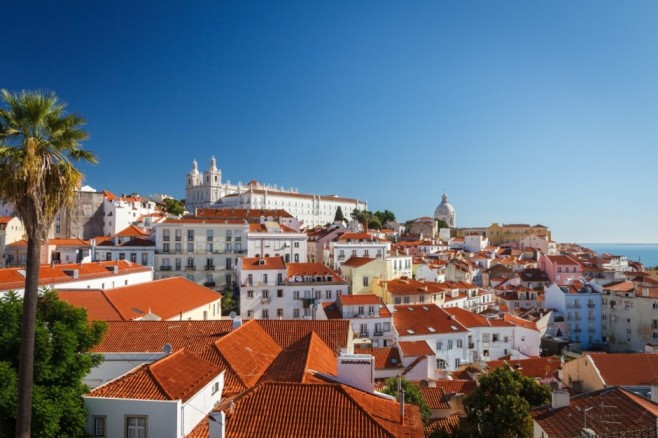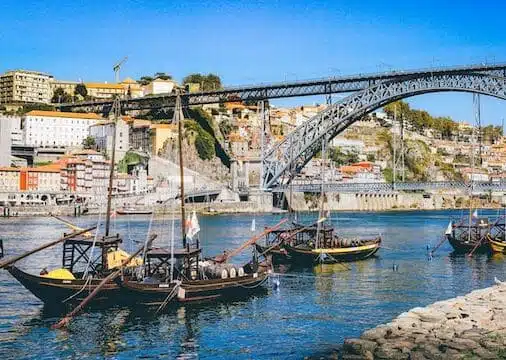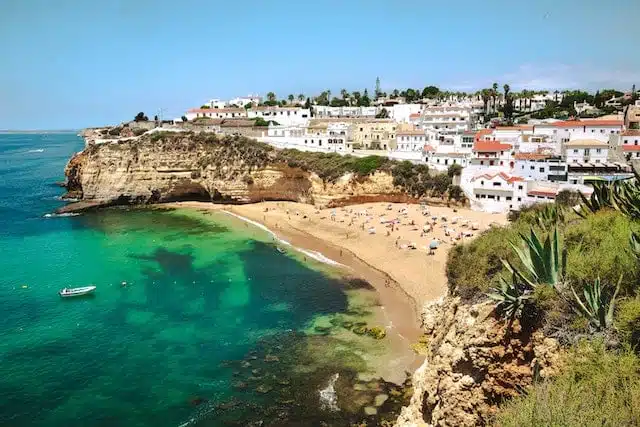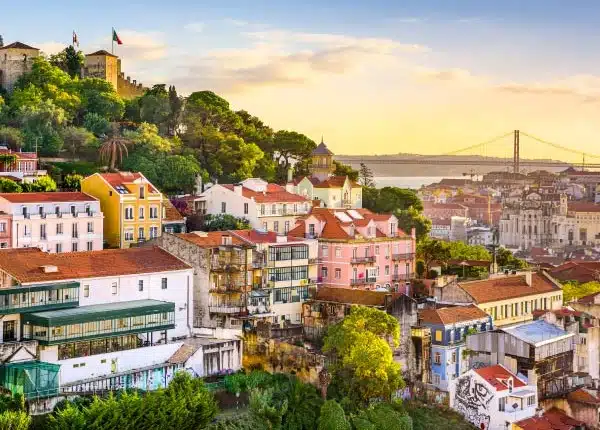Updated: November 20, 2025
Living in Portugal is a preferred option for foreigners from Brazil, the United States, South Africa, China, UK, and many other countries. Expats come here searching for better safety standards, affordable living costs, and tax-friendly policies. Its strategic location makes it an entry point to the Schengen Area, giving it access to one of the biggest EU markets, with almost 500 million consumers from 27 countries.
But it’s one thing to move to a different country, and another to live there. That’s why it is important to look at the pros and cons of life in Portugal. The comfortable living conditions, regular sunshine, and stunning beaches draw expats to Lisbon, Cascais, Porto, and the Algarve. However, the slow bureaucracy and low minimum wage can be major drawbacks for those who are used to high living standards.
While Goldcrest gives Portugal a five-star rating, we compiled a handbook based on statistics that takes into account all the good and the bad things about making this stunning country in the southwest of the Iberian Peninsula your new home.
Stick around to read about:
Quick Summary
- Cost of living: Portugal stands as one of the more affordable places to live compared to the rest of Western Europe.
- The number of Americans in Portugal has increased by 36 percent between 2023 and 2024, highlighting the country's appeal.
- Excellent healthcare, schools, and quality of life: The country has universal public healthcare and private health insurance at a reasonable cost, with 51 excellent international schools, and high quality of life.
- The drawbacks: The biggest setback is the slow bureaucracy, followed by crowded tourist areas and rising housing costs.
Why Choose Portugal for Living & Relocation
Portugal is a good country to live in. It has excellent safety standards, a high quality of life, reasonable living costs, and great education. If you enjoy regular sunshine and a warm summer breeze, the pros of Portugal outweigh the cons.
Living conditions are very high for expats living in Portugal. The country offers access to universal healthcare, cheap public transport, modern amenities, and a low crime rate. The infrastructure is reliable, and people enjoy fast internet connections.
Americans Living in Portugal
If you are moving from the USA, you will find that the number of Americans living in Portugal in 2025 has jumped massively in recent years. In 2023, there were 14,129 Americans living in Portugal, which increased to 19,258 in 2024, indicating a 36 percent of US nationals living in Portugal, according to data from Portugal’s Agency for Integration, Migration, and Asylum (AIMA). This has only increased further in 2025.
Alongside this, North American investment has surged to 82 percent during the second quarter of 2025, with the luxury real estate market establishing itself as one of the most robust markets. There has been increased focus on two-bedroom apartments and four-bedroom villas in premium areas of Lisbon and the Algarve. Americans seeking to relocate to Portugal will likely be able to stretch their money further.
Pros of Living in Portugal
Portugal offers an excellent quality of life due to its great safety standards, reliable healthcare, and budget-friendly living conditions. Below is a list of all the good things about living in Portugal.
 1. High quality of life
1. High quality of life
According to the Global Citizen Solutions Quality of Life Index, Portugal ranks sixth in the world for the quality of life it offers. Friendly locals prefer a slower pace of life, especially compared to major US cities like New York and San Francisco.
Portugal’s quality of life is renowned across the globe. People have a strong focus on family and take pride in the country’s rich history, cultural heritage, and diverse landscapes.
While residents generally enjoy a slow pace of life, you can still explore the hustle and bustle in cities like Lisbon or enjoy a more laid-back lifestyle in places like the Algarve.
 2. High level of safety with low crime rates
2. High level of safety with low crime rates
So, is Portugal a safe place to live? Yes. It ranks 7th on the Global Peace Index in 2025, right after Singapore and Switzerland, making it one of the safest countries for everyday life. Portuguese people enjoy a relatively relaxed lifestyle.
Portugal’s crime rates are relatively lower than those of New York City, Paris, and London. The Portuguese government implemented strict gun laws to create better stability for everyone in the country.
Portugal is also incredibly welcoming to LGBT expats, making it one of the most attractive destinations globally for both living and tourism.
 3. Affordable cost of living
3. Affordable cost of living
Living expenses in Portugal are relatively low, with an average couple spending €2,500 to €3,000 a month. However, Lisbon, the capital city, tends to have higher living costs but attracts the highest number of tourists, investors, and entrepreneurs.
For example, rent for a one-bedroom apartment in central Lisbon can cost over €1,407, and in Porto, over €1,044 in the city center. A single person can spend about €752 per month, without rent, and €2,677 for a family of four, based on Numbeo.
The cost of living in Portugal is more affordable than in the United States, Spain, and the United Kingdom. Family members spend less on groceries, restaurants, rent, and real estate, while still enjoying a high quality of life.
The table below offers the average costs in Portugal for products you would buy regularly.
Item | Cost (in Euros) |
Milk (regular, 1 liter) | €0.94 |
White rice (1kg) | €1.43 |
Local cheese (1kg) | €10.25 |
Loaf of fresh white bread (500g) | €1.41 |
Eggs (regular, 12) | €2.77 |
Beef round (1kg) | €12.56 |
Chicken fillet (1kg) | €6.66 |
Banana (1kg) | €1.28 |
Apples (1kg) | €1.95 |
Oranges (1kg) | €1.63 |
Potato (1kg) | €1.48 |
Tomato (1kg) | €2.18 |
Onion (1kg) | €1.72 |
Lettuce (1 head) | €1.35 |
Cigarette (20 pack, Marlboro) | €5.50 |
Source: Numbeo
For example, the cost of living in Portugal vs USA is significantly lower in Portugal for housing and healthcare. In Lisbon, you can rent a one-bedroom apartment at a fraction of the cost compared to major US cities like New York or San Francisco.
 4. Warm summers with mild winters
4. Warm summers with mild winters
Portugal is a popular EU country for foreign nationals due to its sunny climate. Every year, Portugal gets about 300 days of sunshine. While winters are mild, summers are warm, particularly in the south.
The Algarve is known for its warm summers and very mild winters, perfect for those who prefer sunny weather. Lisbon and Porto generally experience hot, dry summers and short, rainy winters.
The warmest season in Portugal lasts from around mid-June to late September, with daily average temperatures exceeding 25 degrees Celsius (78 degrees F). These months are also the sunniest and bring with them a lot of outdoor activities like water sports and golf.
 5. Excellent public and private healthcare
5. Excellent public and private healthcare
Portugal’s health care system is extensive, and in 2024, about 10.2 percent of its GDP (Growth Domestic Product) was dedicated to health expenditures. Portuguese residents and citizens get many free services with small co-payments in the public healthcare system (Serviço Nacional de Saúde or SNS).
However, those who prefer to reduce wait times and faster service often pay for private Portugal healthcare, which is more affordable than in the United States and many other European countries.
Private health insurance in Portugal starts at about €30 per month for one person. Healthcare experts tend to speak English, making their services more reliable for expats.
 6. High education standards
6. High education standards
Schools in Portugal provide quality education. According to the Global Education Report by Global Citizen Solutions, Portugal ranks 25th due to its effective policies, curriculum, and qualified teachers. The University of Lisbon, the University of Porto, and the University of Coimbra are some of the leading Portuguese universities, based on the QS ranking in 2025.
You can find international schools in Portugal, mostly in Lisbon, Porto, and the Algarve. Meanwhile, the private sector generally has a smaller class size, more extracurricular activities, and more modern facilities.
The Portuguese government also continuously invests in its school facilities and educational materials for public schools, ensuring a high standard of education.
Degrees from Portuguese universities are recognized across the European Union, making it easier for graduates looking to work in other EU countries. Many university courses are taught in both Portuguese and English, although English courses are not available at all universities in Portugal.
 7. Thriving startup and tech scene
7. Thriving startup and tech scene
Portugal’s startup landscape is booming due to a supportive immigration process, qualified talent, tech innovation, and government incentives.
Cities like Lisbon, Porto, Braga, and Coimbra are top destinations for entrepreneurs, investors, and remote workers looking for a Portuguese residence permit and access to the local market.
Annual events, like the EU-Startups Summit and Web Summit in Lisbon, bring together thousands of startup enthusiasts, investors, corporates, and media reporters from around Europe.
Living in Braga can also offer many new job opportunities for foreigners, especially skilled tech workers.
 8. No restrictions on foreign property ownership
8. No restrictions on foreign property ownership
Buying property in Portugal is simple for foreigners. There are no restrictions on purchasing a house, apartment, or villa. You can buy property without being a resident or having a visa.
However, there is a procedure to follow when buying property as a foreigner, which includes getting your own Portugal NIF number (Número de Identificação Fiscal), a tax identification number used for financial transactions in Portugal.
Opening a Portuguese bank account can also help reduce transaction costs. If you’re working with a buyer’s agent, they can offer professional advice on the purchasing process.
 9. Welcoming immigration policies
9. Welcoming immigration policies
To live in Portugal, you will need a visa. So, suppose you are buying property and relocating. In that case, you can apply for visas such as the Golden Visa for investors, the Digital Nomad Visa for remote workers and freelancers, and the Passive Income Visa for retirees.
The Portuguese government has made a range of visa options available over the years, making it easy for expats to move to the country.
 10. Attractive tax system
10. Attractive tax system
The Portuguese government created a favorable tax system for expats to attract skilled foreign workers, investors, and entrepreneurs. One such example is the Non-Habitual Resident (NHR) regime, which offered significant tax benefits to new residents for a period of ten years.
The NHR officially ended for new applicants on 1 January 2024, and was replaced with the Tax Incentive for Scientific Research and Innovation, often called the NHR 2.0. This new program replaced the standard inheritance tax with a Stamp Duty (Imposto do Selo).
Portugal’s NHR 2.0 offers many tax advantages for skilled professionals in fields like scientific research, technology, and innovation. It provides a flat tax rate of 20 percent for qualified professionals in these fields for ten years.
If you inherit money or property from a close family member, that inheritance is tax-free. But, if the inheritance comes from someone who isn’t a close relative, or it is high-value real estate, then certain taxes may apply, like Stamp Duty of 10 percent.
 11. Extensive public transit system
11. Extensive public transit system
Getting around major cities like Lisbon and Porto is easy thanks to their reliable public transportation systems. They have trams, buses, and metros – all organized efficiently and covering different areas convenient for tourists, investors, and family members.
A one-way ticket in Lisbon costs about €2.00 to €3.10, and a monthly pass is about €40.00 for the Navegante Metropolitano pass. But the specific prices will vary based on the transport you use and your desired locations.
Many people use a car or ridesharing apps like Uber and Bolt to get around. Getting a Portuguese driver’s license or exchanging your current one for a Portuguese one is also relatively straightforward.
 12. Lots of fun things to do
12. Lots of fun things to do
Portugal is always a lively place to live. In 2024, the country received 24 World Travel Awards for its attractions, beaches, and resorts. Included in the list of winners was Lisbon, taking the title of Europe’s leading city destination for 2024.
You can swim in the Atlantic Ocean, explore the mountain ranges, visit castles and fortresses, and go hiking. You could also go fishing, surfing, diving, and even luxury shopping in Portugal.
Portugal’s nightlife is a world of its own, and there is always something to do once the sun goes down.
 13. World-class food and wine
13. World-class food and wine
If you want to taste good food and excellent wine, then Portugal is the place to be. Portuguese cuisine is all about bold flavors and simple, high-quality ingredients, whether it’s the crispy, custard-filled pastel de nata or the freshest seafood straight from the Atlantic Ocean.
In fact, Lisbon was crowned Europe’s Best Culinary City Destination in 2024, a well-earned title for its mix of Michelin-starred restaurants, cozy neighborhood tascas (family-run traditional restaurants), and innovative chefs.
 14. English is widely spoken
14. English is widely spoken
Many Portuguese people speak English very well, with Portugal ranking sixth on the EF English Proficiency Index. This makes it easy to communicate even if you are not fluent in the Portuguese language. For example, British expats and Americans living in Portugal can adapt quickly without learning basic Portuguese before moving.
 15. Large expat communities
15. Large expat communities
In the major expat areas like Lisbon, Porto, and the Algarve, Portugal expat communities are growing and thriving. You’ll find a diverse mix of expats from around the world, such as America, Brazil, Spain, the UK, and beyond.
Portugal also has progressive LGBTQIA+ rights and laws, in addition to Pride festivals and events, making it a welcoming place for members of the LGBTQIA+ community.
 16. Beautiful beaches and natural beauty
16. Beautiful beaches and natural beauty
Portugal’s entire coastline stretches for 1187 km, with plenty of gorgeous picture-perfect beaches for surfers and water sports enthusiasts. The country boasts many stunning Blue Flag beaches, known for their pristine waters and environmental quality, from the golden cliffs of Praia da Marinha to the massive waves of Nazaré.
Beyond the coast, Portugal’s natural landscapes are just as breathtaking. The Serra da Estrela mountains, Douro Valley vineyards, and volcanic beauty of the Azores and Madeira provide endless outdoor adventures, making Portugal a top destination for nature lovers. Living in Madeira offers affordable living, excellent healthcare, and great weather.
Buying property in Madeira is a lucrative investment, especially in prime locations like Funchal and Calheta.
 17. Rich culture and history
17. Rich culture and history
Portugal offers a rich cultural heritage shaped by centuries of history, from ancient Roman ruins to medieval castles and Moorish architecture. The country’s traditions are woven into daily life, from Fado music and colorful festivals to museums, historic towns, and UNESCO World Heritage sites.
Cons of Living in Portugal
Life in Portugal has its advantages and disadvantages. Just like anywhere else in the world, you can expect to face the cons of everyday life in this country. Some of these drawbacks require additional financial planning and re-adjustments.
Here are some of the bad things about living in Portugal:
1. Slow and complicated bureaucracy
One of the most frustrating aspects of life in Portugal is the slow bureaucracy, consistent delays for public services, and outdated systems. The government takes a long time to process paperwork for getting a visa, residency status, and applying for Portuguese citizenship.
2. Low minimum wage
Portuguese tend to complain of low wages, especially in low-paying sectors like retail, tourism, and hospitality. In 2025, the minimum average monthly salary (gross) is about €870. However, this needs to be weighed up against the cost of living, which is generally much lower than in other Western European countries, particularly outside major cities. When you compare the minimum wage to the cost of rent for a one-bedroom apartment in Lisbon (€1,055) outside the city centre, it can be difficult to get by.
3. Limited job opportunities for foreigners
It is not easy to get a job in Portugal, especially if you don’t have the skills or qualities to set you apart in the local market. The unemployment rate reached 6.30 percent in March of 2025, significantly higher than in countries like the Netherlands and Slovenia, based on recent data from Trading Economics.
4. Higher housing costs
There is a discrepancy between supply and demand, with demand outpacing supply leading to price increases, where the average cost to buy real estate in Portugal went up by 135.2 percent since 2014. The costs were more pronounced in major cities like Porto and Lisbon. The imbalance in wages and real estate prices has created a housing shortage.
5. Lack of central heating
In Portugal, there is no central heating, like you would get in the United States or Northern Europe. Many old properties do not rely on central heating because the country has a relatively mild climate. However, for the elderly and people with particular health complications, poorly insulated buildings may be cold to live in during the winter.
6. Language barriers while traveling
Although English is widely spoken in the country, non-Portuguese speakers may find it difficult to get around in smaller towns. Some older regions and rural areas speak Portuguese rather than any other foreign language, which can make it challenging to get around. That’s why it is highly recommended to start learning Portuguese if you plan on living there.
7. Locals prefer cash payments over credit cards
Some places in Portugal may not accept cards or foreign credit cards, especially in small towns. So, it would be in your best interest to bring cash. However, in major cities like Lisbon or Porto, many places accept Mastercard or Visa without issues.
8. Influx of tourists during peak season
Tourist areas, like Lisbon, Carcavelos, Cascais, Sintra, Cabo da Roca, and parts of the Algarve, get very crowded from June to August. Although tourism brings consistent revenue to the country, prices increase, traffic gets worse, and the cities and popular areas can become very loud, particularly when there are also local events, such as the Santo António festival in Lisbon in June. While Lisbon and the Algarve do experience high influxes of tourists during the peak season, they remain fantastic places to live.
9. Toxic work culture
It can be difficult to establish a work-life balance in Portugal compared to some other European countries. Certain companies, mainly in the retail, hospitality, and tourism sectors, tend to have rigid hierarchies with work overtime and high turnover rates. However, this will depend on where you work.
10. Difficult integration
The easiest way to integrate in Portugal is to work for a Portuguese company and spend time with coworkers. But, many foreigners, especially from the United States, may find it hard to integrate because of the drastic cultural differences, bureaucracy, customs, and way of Portuguese life.
Where to live in Portugal?
The best places for expats to live in Portugal are Porto, Lisbon, Cascais, and the Algarve region. Lisbon attracts professionals and digital nomads, Porto draws creatives and students, while the Algarve is popular with retirees. British expats are often situated in Lisbon and Porto.
Lisbon
 Lisbon is one of the best places to live in Portugal. The cosmopolitan capital offers rich cultural traditions, youthful innovation, and an urban feel. Many international startups are relocating to take advantage of the business opportunities here.
Lisbon is one of the best places to live in Portugal. The cosmopolitan capital offers rich cultural traditions, youthful innovation, and an urban feel. Many international startups are relocating to take advantage of the business opportunities here.
The cost of living in Lisbon is higher than in the rest of Portugal, especially when they buy real estate. However, property prices remain affordable when compared to other European countries and major US cities.
Each neighborhood has its own personality, and choosing the right one for you will depend on your interests and what you are looking for. Lisbon appeals to expats moving to Portugal with a family, setting up local businesses, working as a digital nomad, or retiring in a stunning European capital.
You can see our guide to the best neighborhoods in Lisbon: Best Neighborhoods in Lisbon.
Cascais
 Very close to Lisbon (just a short 30-minute drive away), you will come across the former fishing village of Cascais.
Very close to Lisbon (just a short 30-minute drive away), you will come across the former fishing village of Cascais.
Despite having more than 200,000 inhabitants, Cascais still retains a village feel, with traditional architecture, excellent seafood restaurants, and nine golf courses close by, making it a very attractive destination for expats relocating to Portugal.
For families, Cascais real estate offers plenty of options – there are spacious mansions and waterfront villas to be found here and excellent schools within a twenty-minute drive.
Want to know what it’s really like living in Portugal? Check out our article: Portugal Reality vs Expectations.
Porto
 The dynamic city of Porto has really come into its own over the last few years. Now, it is on par with Lisbon as being considered the most beautiful city in Portugal, and with good reason.
The dynamic city of Porto has really come into its own over the last few years. Now, it is on par with Lisbon as being considered the most beautiful city in Portugal, and with good reason.
The historic city is stunning, with beautiful beaches showcasing the city’s natural beauty, local markets, activities on offer, and delicious Portuguese wine to drink in the Port wine houses along the River Douro in Vila Nova de Gaia.
Porto real estate is booming, and there are many excellent waterfront properties to be found here, making it a particularly attractive destination to settle.
If you are looking for waterfront properties in Portugal, you can move to the Foz Do Douro neighborhood. Check out our article on Waterfront Homes in Portugal: The Best Locations for more information.
The Algarve
 The beautiful Algarve coast is renowned for its pristine beaches, stunning landscapes, and year-round sunshine, even in the depths of winter. A firm favorite with tourists and well-known amongst British expats, many American expats in Portugal have now discovered the region and come to call the Algarve home.
The beautiful Algarve coast is renowned for its pristine beaches, stunning landscapes, and year-round sunshine, even in the depths of winter. A firm favorite with tourists and well-known amongst British expats, many American expats in Portugal have now discovered the region and come to call the Algarve home.
Algarve real estate is also much desired. In the Central Algarve, Vilamoura is popular amongst expats and offers an array of luxury properties. As a resort town with a 1,000-berth marina, golf courses galore, luxury hotels, and exclusive beach clubs, it is an excellent location to consider.
Vilamoura, along with the resorts of Vale do Lobo and Quinta do Lago, forms part of the Golden Triangle in the Algarve, a renowned affluent area. Many celebrities who have bought homes in Portugal choose the Golden Triangle thanks to its luxury lifestyle and high quality of life.
Families with children can also have peace of mind knowing that there are 12 Algarve international schools to choose from, including Eden Montessori International School and Vale Verde International School. Each school provides a high-quality and culturally enriching education. Living in Lagos is a perfect choice for nature lovers. It has also been increasingly popular amongst Americans in recent years.
It is also worth researching Albufeira, characterized by its cobblestone streets lined with restaurants, and where something is always going on in the evenings. Vilamoura and Albufeira are conveniently close to Faro Airport, an added bonus for avid travelers.
The Eastern Algarve provides a more authentic Portuguese experience on the other side of southern Portugal. Living in Tavira, for example, has become quite popular among expats. Tavira is a standout, authentic city with its distinctive whitewashed buildings and blue façades.
Moving to Portugal for Foreigners
Portugal has welcoming immigration policies. If you are an EU national, gaining a Portuguese residence permit is straightforward, given that it is free to live, work, and travel in the country. For non-EU citizens searching for a permanent residence permit, the Portuguese authorities offer a wide range of options to cater to all expats.
Below are some of the more popular pathways to residency and life in Portugal
The Portugal Golden Visa Program
 The Portugal Golden Visa is a residency by investment program available to foreign nationals (non-EU, EEA, or Swiss citizens). By making a qualifying investment in the country, you and your family can become temporary residents in the country.
The Portugal Golden Visa is a residency by investment program available to foreign nationals (non-EU, EEA, or Swiss citizens). By making a qualifying investment in the country, you and your family can become temporary residents in the country.
This permit allows you to travel to the EU Schengen area visa-free, and after a set number of years legally living in the country, you can apply for permanent residency, which eventually can lead to Portugal citizenship.
As of late 2023, real estate investments no longer qualify. Instead, applicants can choose between different options, such as €500,000 into a qualifying investment or venture capital fund, €250,000 in contribution, or creating ten new jobs in a Portuguese company.
The D7 Visa
The Portugal D7 Visa, also known as the passive income visa, is the best option for earners with a stable passive income. Through this visa, the Portuguese government allows non-EU citizens to obtain Portuguese residency as long as they have sufficient passive income to support themselves during their stay in Portugal (at least €870 per month, Portugal’s minimum wage).
The Portugal D7 Visa is a great option for retirees and entrepreneurs interested in moving to Portugal without making a major financial investment.
The D8 Visa
 The Digital Nomad Visa (or D8 Visa), introduced in 2022, allows you to relocate to Portugal, provided you work for a foreign (non-Portuguese) employer.
The Digital Nomad Visa (or D8 Visa), introduced in 2022, allows you to relocate to Portugal, provided you work for a foreign (non-Portuguese) employer.
This visa offers a pathway for temporary residency in Portugal without participating in local employment. To qualify, you will need to demonstrate a stable and reliable source of income from your remote work or business activities, earning at least four times the Portuguese minimum wage (about €3,480).
You can also secure a residency visa through marriage and by studying. Another popular visa option for entrepreneurs is the D2 Visa in Portugal.
You can contact our partners at Global Citizen Solutions for a full analysis of which visa option may be best for you.
Life in Portugal
Portugal provides all its inhabitants with affordable healthcare costs, high living standards, and a safe place to raise children. People here value family life and respect traditional values. Portugal ranks among the best countries for Americans to retire, with cheaper rent and property prices than the United States.
Housing Tips: Renting vs Buying
Whether you decide to rent or buy property in Portugal, you should think about your budget, long-term goals, and the lifestyle you want. Renting provides a lot of flexibility and lower upfront expenses, especially if you are targeting Lisbon real estate.
But if you buy a house, you build equity over time. Some of the best neighborhoods in Portugal, such as those in North and Central Portugal, can offer high appreciation potential.
At Goldcrest, we know the Portuguese real estate market inside and out. Whether you are renting or buying property, our buyer’s agents can guide you through the purchase process and research the local market.
What can Goldcrest do for you?
Goldcrest is a buyer’s agent that applies tried and tested formulas for buying property in Portugal. We research current market conditions and help you find properties that fit your budget. Our team visits properties on your behalf, negotiates with the seller, and guides you through the legal process of property acquisition.
We are based in Lisbon and have years of experience working with properties across the country. We can connect you to real estate lawyers, designers, architects, and landscape gardeners so you can build your dream home. Whether you need property research or after-sales services, contact us today.
Frequently Asked Questions about Living in Portugal - Pros and Cons
Can Americans move to Portugal?
Yes, Americans can easily move to Portugal. Many visa options, such as the Golden Visa, Digital Nomad Visa (D8), and D7 Visa (Passive Income Visa), can lead to residency.
Where to live in Portugal as an American?
The average American expat living in Portugal tends to favor urban areas, such as Lisbon and Porto. The Algarve is also a popular destination, while the Silver Coast and more rural parts of the country are picking up interest from expats.
Is Portugal a nice place to live?
Portugal is considered one of the best places to live. It is a safe country, and its residents enjoy many benefits, such as good healthcare, education, and a good quality of life. The Portuguese culture is also vibrant.
What’s it like living in Portugal for three months?
Living in Portugal for three months can offer different experiences. You can meet many nomads and travelers in vibrant cities and coworking spaces, mainly in Lisbon and Porto. Compared to some other Western European countries, the infrastructure seems to be constantly improving, which can affect your daily life.
Is Portugal friendly to foreigners?
Yes, locals are very friendly and can make foreigners feel at home. For example, the best cities to live in Portugal, like Lisbon and Porto, have large welcoming communities that speak English.
How much money do I need to live comfortably in Portugal?
In large cities, like Lisbon and Porto, you need €2,500 to €3,000 to live a comfortable life, which also includes rent. Smaller towns are more affordable, and people live comfortably on a €1,200 to a €1,800 budget. The overall costs vary considerably based on your lifestyle.
Do they speak English in Portugal?
Yes, the average Portuguese citizen speaks English well enough for everyday interactions. Based on the EF English Proficiency Index, Portugal ranks 6th with a score of 605, which is very high for a non-native English-speaking country.
Can you live in Portugal on $3,000 a month?
Yes, €3,000 a month is enough to live comfortably in regions like the Algarve and the Silver Coast. This budget covers rent, food, transport, and leisure. Smaller towns often provide lower living costs, which allow you to save more money.
Do I have to pay US taxes if I live in Portugal?
Yes, US citizens must file US taxes even if they live in Portugal. The US taxes are based on citizenship, not residency. However, the Foreign Earned Income Exclusion and the US-Portugal tax treaty help avoid double taxation. You must still report income annually to the IRS (Internal Revenue Service), including foreign bank accounts.